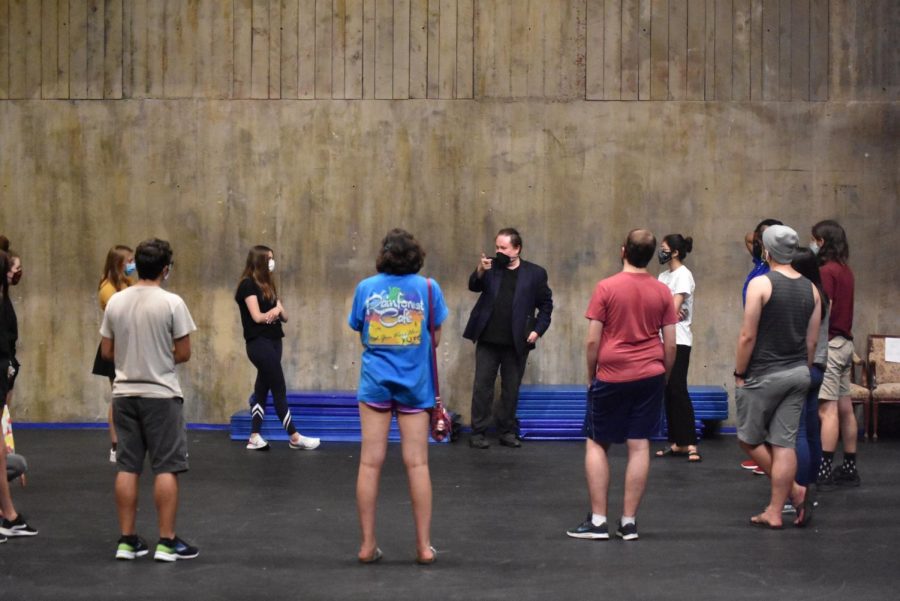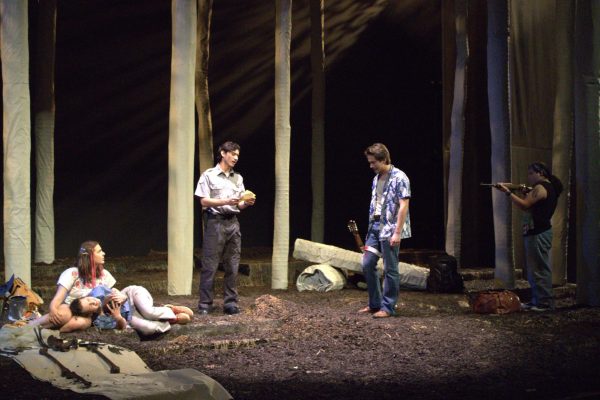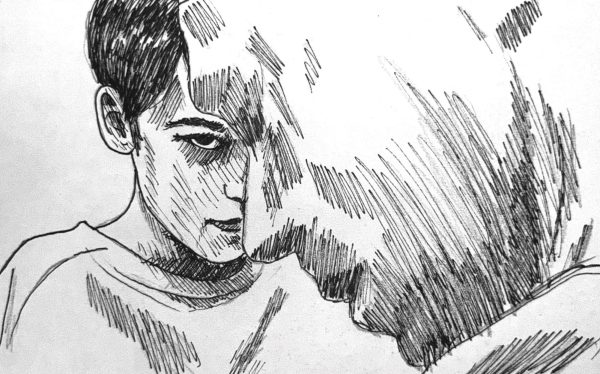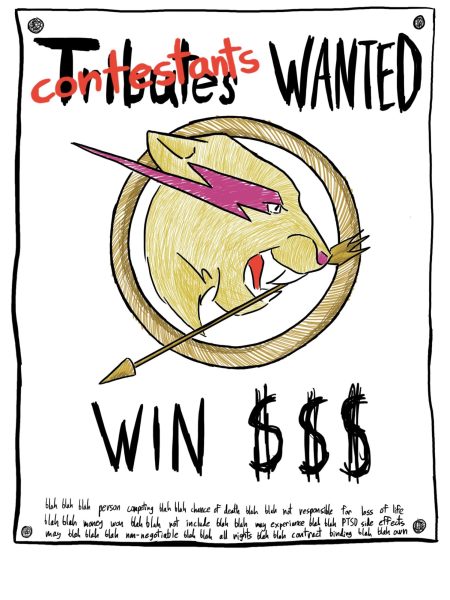Theatre department reflects on first show of season, “365”
The immersive show encouraged audience and cast members alike to step outside of the box
The theatre department’s first show of the season is “365 Days/365 Plays.” Trinity’s largely student-organized production goes through around 20 of the total 365 plays written by Suzan-Lori Parks, lasting only 45 minutes. The show opened on Friday, Oct. 1 and ran through Saturday, Oct. 9. I talked to Kyle Gillette, the faculty director for “365”, as well as two cast members, junior Seiler Nishimura and first-year Eyan Absar, to see how the production turned out.
A major component of “365” is the immersive nature of the production, which sees the limited audience led around and through the Ruth Taylor Theater. The distinct and physical changes in setting lend themselves to the experience of the show as disjointed. The movement also shifts the audience from a passive role to a more active role as it is easier to feel encompassed by the production.
“With site-specific performances, the history of this place, its other contours that pre-exist, there’s a sense of the layers of what this space has been used for,” Gillette said. “The mobility makes you more of someone who is discovering things, and your activity is a big part of what you see.”
In addition, the size of the group moving through the spaces changes the audience’s experience.
“Some immersive pieces allow only one person at a time. I think there’s a sense [within the audience] that I’m part of this strange little pack that travels together, and that each thing along the way is a surprise that’s both spatial and narrative. Especially since a lot of the pieces aren’t necessarily narrative, I think the journey becomes the narrative,” Gillette said.
But the immersive nature of the production and the movement of the audience posed some logistical questions for the cast and crew. They eventually settled on having a cast member from the previous piece lead the audience to the setting for the next scene.
“It was definitely stressful because you’re not used to talking to the audience like that. And then making sure everyone can hear you the whole time, and everyone’s wearing masks, and trying to make sure there’s room for everyone and stuff like that. It’s just very different,” Absar said.
Since not every play could be performed, selecting the pieces to perform was a collective effort among the cast. Interestingly, there are three pieces — called the three constants — that every production of “365 Days/365 Plays” must have. These pieces do not have to be in any particular order, but this rule comes from Suzan-Lori Parks herself.
“When the cast got together, I asked both if anyone wanted to direct and, ‘What are your favorites?’ A lot of people had certain favorites. And several of the cast came back to certain themes that are woven through the plays. There’s things about war and poverty, there’s things about politics and power, there’s sort of this theme of fantasy and reality as well. So we tried to touch on some of the things that kept returning,” Dr. Gillette said.
For Absar, the piece “All I Can Say is Thank You” struck a chord. The play depicts an actor rehearsing a thank-you speech given to them by a writer and highlights the nuances of what happens when an actor wants to say more but is only given so many words.
“I was like, ‘Wow, it’s really funny.’ And as a theatre kid you can relate because the whole point is the actor just wants more lines. You just want to get up there and do the whole scene. And the writer just doesn’t want to give [the actor] that. I really feel that because I’ve been on both sides. I’m a writer too and have to decide how much of a voice do I give characters. I just really liked that you could take [the scene] in either direction,” Absar said.
There were favorite pieces among the audience as well as among the cast and crew. “I think the audience got a big kick out of ‘The Great Wave Off Kanagawa’ where everyone’s waving and there’s call and response. And then there’s a piece called ‘All Things Equal’ where a bunch of [beauty pageant] queens come out and they’re waving to the crowd, wearing crowns. At first, there’s just one, and then it’s a couple, and eventually there’s 16 all competing. So I think the audience likes that,” Gillette said.
There was an excitement about simply getting to be together again within the cast. The cast of “365 Days/365 Plays” consisted largely of first-years, with a handful of juniors. This composition created a certain sense of togetherness.
“I really feel like there’s no stupid question,” Absar said. “Everyone’s confused about the layout of the theater — there’s always doors, you don’t know where they lead, there are stairs that just go on forever. We all can kind of relate to that confusion and figuring stuff out.”
One of the many unique things about Trinity’s production of “365 Days/365 Plays” is the inclusion of pre-recorded pieces throughout the 45-minute runtime. The pre-recorded pieces are projected onto the stage, giving the impression of a mini-film festival of sorts. In addition, many of the pieces not performed live were student-directed. Junior Seiler Nishimura, a veteran of Trinity Theatre mainstage productions, performed in a pre-recorded play called “Dragon Song.”
“I was thinking maybe I would be in the live performance. I was going in-between that and the filmed pieces. Being in only one of the films allows me a lot more freedom to do other stuff that’s going on, which I am not usually awarded, “ Nishimura said.
The inclusion of pre-recorded pieces created opportunities for students who were not trying to add another large commitment to their plate to get involved with the production. The sense of camaraderie among the cast was also fostered by the opportunities for students to direct individual pieces.
“[Dragon Song] was directed by a freshman. They just wanted to take over, and I think it was good. It was very free-flowing,” Nishimura said.
“365 Days/365 Plays” was not the first time Trinity Theatre has stepped outside the box of more traditional theatre, and it likely will not be the last.
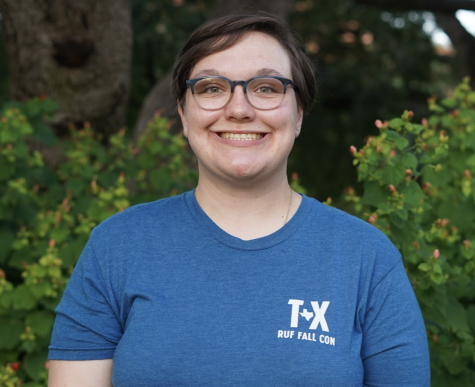
My name is Ayden Smith and I am a junior studying English here at Trinity. I am from Friendswood, Texas, and grew up coming to San Antonio for little vacations....

